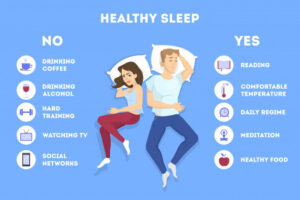
There have been many studies concluding that sleep science has a close relationship with rest and our mental health, providing an awareness of a proper repose for the body and brain. Sleep deprivation or poor sleep both lead to anxiety, depression and other medical problems, thus generating further sleep issues or sleep disorders. It should be noted that even a single night of insufficient sleep could have really drastic consequences. Let us discuss some of those now.
Slow-moving mind
The night you do not get sufficient sleep, the next day has the following consequences such as reduced attention plan, reduced alertness, and problem-solving capabilities. Insufficient sleep during your younger days also affects your intelligence and mental development.
Risk of Injuries
The chances of causing an accident or an injury are more common after a poor sleep. This situation is even more dangerous when you have to drive after a sleepless night.
Memory Problems
Just like how mobile phone updates from time to time, so does the brain, and sleep is the time when the brain organises all the day’s work. If the brain does not get this time to organise, it is then that memory problems occur along with incapability of assimilating new data.
These are not the only problems related to bad quality sleep, there is much more. Lack of good sleep can result in health problems such as heart diseases, diabetes, obesity, pre-ageing and also mental well being. There is a high risk of getting into depression which is now a rising concern among youngsters and this is closely related to insomnia. Studies have mentioned that a person suffering from insomnia is 5 times more likely than people who have normal sleep habits.
With all the above factors, a good undisturbed sleep of 6 to 8 hours each night is utmost necessary for healthy mental status. Good sleep also needs a comfortable mattress of your choice thus preventing anxiety, keeping you more focused along with being in great shape.
Some more beneficial factors of good sleep are a stronger immune system, better memory, increased learning abilities and a balanced level of hormones necessary for your body and brain. Since ages, sleep has been a healing factor after an illness or injury.
Sleep helps you to be alert
As mentioned earlier, a good night’s sleep allows the brain to get enough rest resulting in an energetic you being ready to take up new challenges, also be more alert and concentrate on your goals.
Stress is diminished
When a person is well-rested with good sleep, his brain would produce less cortisol and adrenaline, the most common stress hormones. This results in a more relaxed and confident feeling.
Stay smart and sharp
Deprived sleep has a severe effect on academics as well as work performance. Good rest during the night helps the mind organise information and convert it into knowledge. A good strategy before an exam or a project is to be prepared well in advance and have a decent sleep the day before that will help in securing better results, instead of going on deep into the night.
Enjoy happiness and peace of mind
When the brain gets enough rest during the night, it has the time to keep all the chemicals required by the body in the right balance, especially the hormones that impact mental awareness, mood and feeling. Sleep helps in remaining calm, relaxed and happy, as in contrast insomnia is associated with depression and mental illness. If you would like to enjoy peace of mind, long and healthy life, give sleep a chance to prioritize your life.
Text Credit : Australian and New Zealand Mental Health Association



